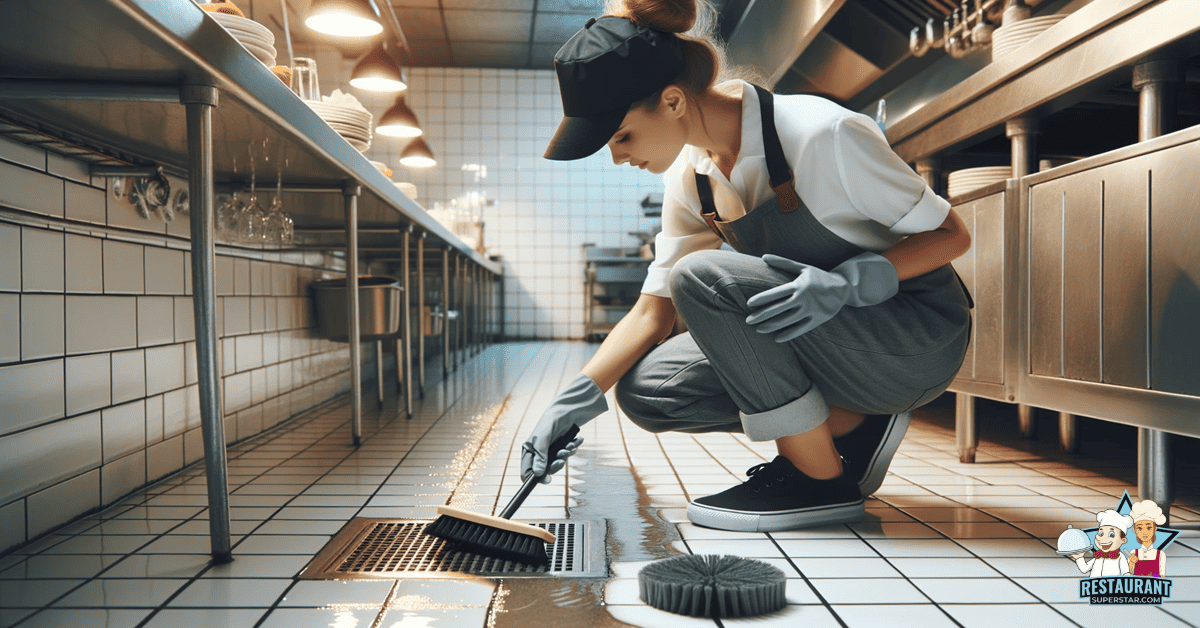Are Restaurants Required to Provide Free Water?
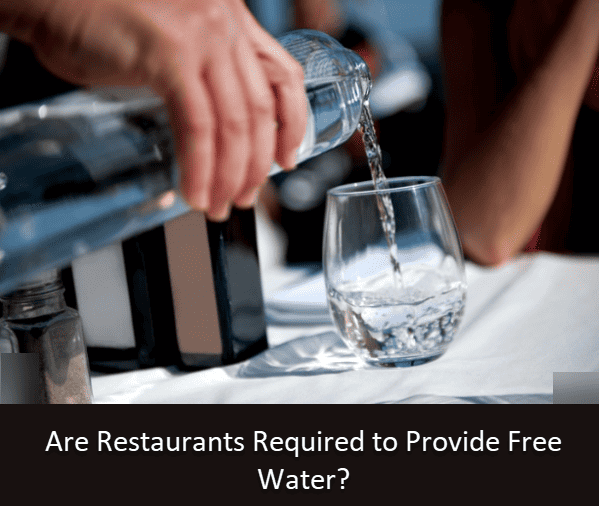
You are in the right place if you’re wondering, “Are restaurants required to provide free water?“
Hey there,
I’m Jeff, a restaurant consultant from sunny Florida. I’ve had the chance to dig into this question and am excited to share what I’ve found.
This article will cover this question and other important aspects of offering complimentary water in restaurants.
Based on my experiences and countless interactions with restaurant owners, I can’t wait to bring you an insightful discussion that will not only engage your mind but also warm your heart.
Looking forward to it.
Are Restaurants Required to Provide Free Water?
Are restaurants required to provide free water?” The answer to your question may depend on your location and whether the restaurant serves alcohol. Countries and regions have diverse sets of laws and regulations on free water in restaurants, making it a topic of considerable interest and importance in the hospitality sector.
Here are some facts to shed light on this:
Are Restaurants Required to Provide Free Water – United States?
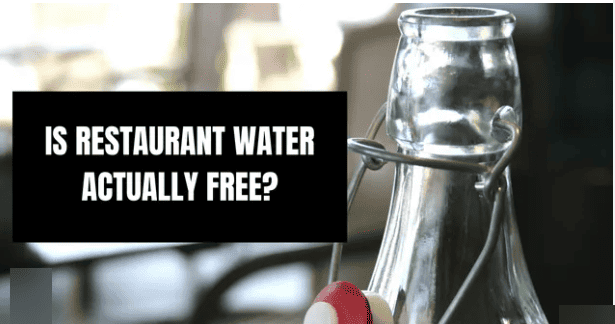
In the vibrant and diverse landscape of the United States, the notion of offering complimentary water service is more of a cultural norm than a strictly enforced legal requirement.
Interestingly, no national laws explicitly mandate restaurants to serve free drinking water to patrons. However, most establishments extend this courtesy, fostering a welcoming and hospitable dining environment.
Local norms and customer service amenities often drive this practice. In my home state of Florida, the sweltering heat makes a glass of water almost necessary, with most restaurants offering refreshing water as you settle down at your table.
It’s worth noting that California has adopted a slightly different approach in response to water conservation needs.
Businesses in California are prohibited from offering water unless explicitly requested by the customer, a policy that aligns with broader environmentally friendly water practices aimed at conserving this precious resource.
Venturing beyond the U.S., we also find varying practices and policies in other countries. In Canada, the law dictates that any business that serves alcohol must also offer free water to their customers, integrating a sense of responsibility and caution in their drinking water legislation.
Are Restaurants Required to Provide Free Water – England and Wales
Across the pond, in England and Wales, establishments licensed to sell alcohol are legally bound to provide “free potable water” to anyone who asks. A similar law in Scotland, albeit with slightly different wording, requires businesses to serve “tap water fit for drinking.”
However, Northern Ireland lacks such legislation, allowing businesses to set water-serving regulations.
Heading further afield to Ireland, the scenario shifts again. Here, there needs to be a legal framework mandating the provision of free water. The businesses, therefore, are under no obligation to offer free tap water, turning it into a gesture of goodwill rather than a mandated service.
Are Restaurants Required to Provide Free Water – Australia
Under Australia, the rules exhibit a marked variation across different territories. While licensed venues are generally expected to serve “cold drinking water” upon request, the specifics regarding whether it’s offered free of cost or at a “reasonable cost” largely depend on the individual premises’ policies.
As we delve deeper into this topic in the following sections, I will share more from my experiences and insights, weaving in the rich tapestry of customer expectations, restaurant hydration etiquette, and more.
Stay tuned as we navigate the fascinating world of restaurant water policies together.
Understanding the Landscape of Water Serving Regulations
Today, I ponder an essential and often debated question in the hospitality sector: “Are restaurants required to provide free water?” As someone who has navigated the intricate corridors of the restaurant industry for years, the answer to this is as diverse as the cuisines we adore.
Let’s embark on this journey together, shall we?
Overview of Existing Drinking Water Legislation Globally
First, we must cast our nets wide and grasp the global perspective. You see, my fellow restaurant owners, the world is a mosaic of different policies and customs when offering complimentary refreshments in eateries.
In many parts of the world, offering a glass of water is seen as a gesture that embodies hospitality and customer service. But what fascinates me is how various regional laws and regulations govern this simple gesture.
It’s not merely a matter of customer service amenities but often intertwines with health regulations and alcohol licensing laws.
From my research and travels, I’ve noticed that in most European countries, especially in establishments serving alcohol, free tap water is more than just etiquette; it’s a legal requirement. This practice undoubtedly promotes a safer and more responsible drinking environment.
Regional Variations in Water Serving Regulations
As we zoom in a bit closer to our home ground, we can witness the beauty of diversity even within our borders. The United States, a land of myriad cultures and practices, hosts various regional variations regarding restaurant water policies.
During my consulting visits along the East Coast, I’ve been heartened to see that most restaurants have embraced the practice of offering complimentary water service.
It seems almost second nature for restaurant staff to greet you with a welcoming smile and a glass of refreshing water. This gesture feels like a warm hug in my sunny home state of Florida, especially during the scorching summer months.
However, as we move towards the west, we notice a shift, mainly driven by environmental concerns. As many of you might know, California has been a forerunner in implementing water conservation policies.
Their approach to water serving regulations is nuanced, focusing on striking a balance between hospitality and water conservation, a lesson in responsible restaurant water supply ethics if you ask me.
The Restaurant Water Policy and How it Varies
Delving deeper into the intricacies of restaurant water policy, it often mirrors the ethos of the region it represents. While in some places, offering water is considered mandatory in restaurants, others perceive it as a voluntary act of goodwill, a hallmark of exceptional customer service.
But here’s where it gets interesting for us, the restaurant owners. Crafting a restaurant water policy that resonates with our patrons requires a deep understanding of the legislation, local customs, and expectations. It’s an art, harmonizing the legal requisites with the timeless tradition of hospitality.
I’ve noticed a burgeoning interest in adopting environmentally friendly water practices while interacting with various restaurant owners. From opting for sustainable water dispensers to fostering a culture that encourages water conservation, the landscape is evolving, and it’s thrilling to be a part of this change.
So, as we sail through this sea of information, let’s keep our minds open to the diverse practices that enrich our industry.
After all, understanding the landscape of water-serving regulations is about adhering to laws and fostering a culture that embodies respect, hospitality, and foresight.
Dining Establishments’ Water Policy: A Closer Look

Let’s continue our vibrant discussion on a topic that seems as clear as water but has depths many still need to venture into – the water policies in dining establishments.
As someone steering the helm in the restaurant consultancy arena, this subject has layers worth exploring.
Let’s take a closer look.
Mandatory Water Provision in Restaurants: Facts and Myths
When we delve into the nitty-gritty of mandatory water provision in restaurants, we’re navigating through a sea of facts interspersed with myths. As restaurant owners, it’s about quenching our patrons’ thirst and desire for a hospitable environment.
Now, let’s bust some myths first. A common misconception is that restaurants are legally bound to provide free tap water to all patrons everywhere. Well, as we’ve seen, the reality is quite different.
The requirement of providing complimentary water is influenced mainly by regional policies. It can vary greatly, even within the same country. I’ve always found it engaging to see how different states in the U.S. approach this matter, each with its guidelines reflecting the local ethos and environmental considerations.
On the factual side, several places have clear-cut legislation on water service, especially in establishments serving alcohol. It’s not just about quenching thirst but promoting responsible alcohol consumption. Now, isn’t that a thoughtful integration of hydration and dining?
During my strolls through various eateries in Florida, I have often been greeted with a refreshing glass of water, even before the menu lands on the table. It’s like a warm Floridian embrace setting the stage for a memorable dining experience.
Insights from Restaurant Owners on Adhering to Policies
Gathering insights from restaurant owners has always been one of my favorite parts of the job. It’s like opening a treasure trove of experiences and learnings.
One thing that has stood out from my chats with different restaurant owners is their genuine desire to provide top-notch service to their customers. And let’s remember that water service plays a significant role.
Many view complimentary water service as adherence to policy and a fundamental aspect of customer service amenities.
I’ve met restaurateurs who have taken this further, infusing their water service with a personal touch. Some offer a refreshing concoction of infused waters, adding flavor to the humble glass of water, turning it into a delightful experience rather than just a mandatory provision. It’s all about adding that personal touch.
Moreover, the dialogue around water policy also brings to the forefront ethical considerations. The industry is more conscious than ever about the environmental implications of water service.
Many are adopting innovative approaches, incorporating environmentally friendly water practices into their operations, conserving resources, and striking a chord with environmentally conscious patrons.
Through my journey, I have witnessed a beautiful blend of adherence to policies while going above and beyond to create a memorable experience for the patrons. After all, these small gestures build a loyal customer base, don’t you agree?
Complimentary Water Service: A Customer Service Amenity
The Role of Complimentary Water Service in Enhancing Customer Service
Now, let’s talk about the cornerstone of the dining experience – customer service. In my sunny home state of Florida and extensive travels, I’ve observed that offering complimentary water isn’t just a practice; it’s a cherished tradition that speaks volumes about a restaurant’s hospitality.
- Creating a Welcoming Atmosphere: There’s nothing like being greeted with a smile and a cool glass of water, especially under the Florida sun. It’s the perfect way to make patrons feel welcomed and valued right from entering.
- Encouraging Hydration: Beyond the pleasantries, offering water is also a health-conscious move. It promotes hydration, ensuring customers are comfortable and well-hydrated throughout their meal.
- Enhancing the Dining Experience: Complimentary water service can often be the unsung hero in improving the overall dining experience. Whether it’s to cleanse the palate between dishes or complement a meal, water is vital to the culinary journey.
- Building a Loyal Customer Base: Here’s the thing – customers love it when you go the extra mile for them. Free water service is a small yet impactful way to create a loyal customer following. It shows that you genuinely care about their comfort and want to improve their experience.
The Transformation of Free Tap Water Service Over the Years
As I reminisce about the early days of my career, I can’t help but notice the remarkable transformation in the approach to free tap water service. Here’s a brief stroll down memory lane:
- Evolution of Service Methods: Once served plainly, many restaurants have transformed water service into an art, offering infused water sparkling options and showcasing environmentally friendly water practices with sustainable dispensers.
- Focus on Environmental Concerns: The industry has grown more conscious of its environmental footprint. Many establishments only serve water upon request to avoid wastage and promote conservation.
- Health and Wellness Integration: In my conversations with restaurant owners, I’ve learned that there’s a growing trend to integrate health and wellness into every aspect of the dining experience, with many even focusing on the health implications of water service, offering options like alkaline water to patrons.
- Legislation and Customer Expectations: As we have seen, legislation around complimentary water service has evolved, influenced not only by health and safety concerns but also by changing customer expectations for free water. It’s not just about adhering to the laws but also about meeting and exceeding customer expectations.
In my journey through the world of restaurants, I’ve seen firsthand how embracing the transformation in free tap water service has elevated customer experiences and fostered a deeper connection between establishments and their patrons.
Hydration and Dining: A Necessary Combination
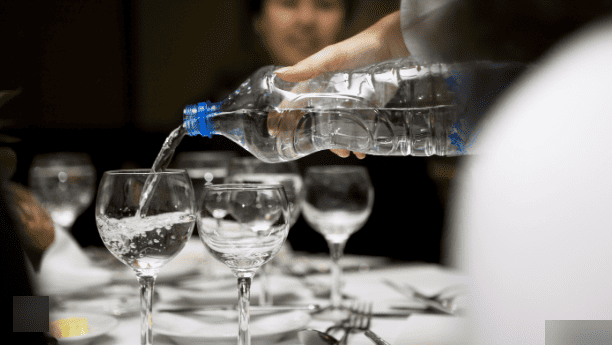
Today, we are venturing further into our comprehensive discourse on whether “restaurants are required to provide free water,” we’re focusing on a facet that holds paramount importance – the harmony of hydration and dining. Let’s dive in and dissect why this combination is more necessary than ever, especially from a restaurateur’s perspective.
Importance of Hydration While Dining
As someone who has spent considerable time navigating the labyrinthine alleys of the restaurant industry, I can vouch for the intrinsic connection between dining and hydration. Let me share why maintaining a balance between the two can be the cornerstone of an exquisite dining experience:
- Boosting Digestion: It’s no secret that water plays a vital role in digestion. Ensuring patrons have access to complimentary water service can aid in a smoother and more comfortable dining experience, enhancing digestion as they savor each meal.
- Promoting Responsible Alcohol Consumption: In establishments where alcohol is served, offering free tap water is not just a customer service amenity but a necessary practice to encourage responsible drinking. It helps in pacing the alcohol intake, potentially reducing the chances of overindulgence.
- Enhancing Food Flavors: Being well-hydrated can strengthen one’s ability to taste. It keeps the palate clean, allowing patrons to appreciate each dish’s intricate flavors and textures fully.
- Creating a Comfortable Environment: A well-hydrated customer is a happy customer. Easy access to water can prevent dehydration-related discomfort, ensuring a pleasurable and relaxed dining ambiance.
Health Implications of Water Service in Restaurants
Navigating the restaurant industry, I’ve often encountered discussions revolving around the health implications of water service. Let’s dive deeper into how this aspect has become a focal point in recent years:
- Nutritional Balance: Offering water not only aids in digestion but also helps in maintaining a nutritional balance. It allows patrons to enjoy their meals without overloading with sugary beverages, fostering a healthier dining environment.
- Prevention of Health Issues: A thoughtful restaurant water policy could prevent dehydration-related health issues. It’s a small step but can significantly contribute to the well-being of the patrons.
- Quality Assurance: As restaurateurs, focusing on the quality of water being served is equally essential. Many restaurants opt for filtered or purified water options to ensure that their customers are served the highest water quality, considering the health implications of water service.
- Customer Well-Being: Above all, prioritizing the hydration needs of customers showcases a restaurant’s commitment to customer well-being. It echoes the sentiment that restaurants are not just food-serving establishments but places that care for the holistic well-being of their patrons.
Navigating the Restaurant Water Supply Ethics
Now, we are treading into a significant importance in today’s eco-conscious world – the ethical dimensions of water supply in the restaurant sector. In this segment, I am thrilled to highlight the ethical considerations and the significance of embracing environmentally friendly water practices in restaurants. Let’s navigate this together!
Ethical Considerations Concerning Free Water in Restaurants
Being knee-deep in the restaurant industry for years, I’ve noticed that the ethical dimensions surrounding the provision of free water in restaurants have grown more nuanced. Here, I’d love to share a few thoughts that have often crossed my mind:
- Waste Reduction: One of the biggest challenges we face is the unnecessary wastage of water. Implementing measures such as serving water only upon request can significantly help reduce waste and positively impact the environment.
- Quality Assurance: As a restaurateur, it’s your moral duty to ensure that the water you serve is clean and safe. Regular checks on the restaurant water dispenser and maintaining hygiene standards should be a priority to safeguard the health of your patrons.
- Community Responsibility: Providing free tap water isn’t just a service but a reflection of community responsibility. It showcases a commitment to fostering a community that values health, hydration, and well-being.
- Promoting Sustainable Choices: Engaging customers in your sustainability efforts can be rewarding. Please encourage them to choose tap over bottled water to reduce plastic waste, fostering a culture of environmental responsibility.
Environmentally Friendly Water Practices and Their Importance
The movement towards adopting environmentally friendly water practices is a trend and a necessity today. Here’s why integrating these practices holds paramount importance in the restaurant business:
- Conservation Efforts: As stewards of the environment, actively participating in water conservation efforts is essential. Simple steps like fixing leaks promptly and using water-efficient appliances can go a long way.
- Reducing Carbon Footprint: Opting for sustainable water sources and reducing bottled water usage can significantly lessen a restaurant’s carbon footprint, positively contributing towards combating climate change.
- Educating Patrons: Often, the change begins at the grassroots level. Educating your patrons about the environmental benefits of tap water over bottled can initiate a ripple effect, encouraging more individuals to make eco-friendly choices.
- Building a Green Brand Image: Embracing environmentally friendly water practices contributes to the planet and helps create a green brand image. It attracts a clientele that values sustainability, fostering a loyal customer base.
As we slowly meander toward the conclusion of our enlightening journey, the exploration of restaurant water supply ethics is a topic close to my heart.
It evokes a sense of responsibility and a vision toward a future where restaurants are not just centers of culinary delight but also hubs of sustainable practices.
Setting up a Restaurant Water Dispenser: What to Know
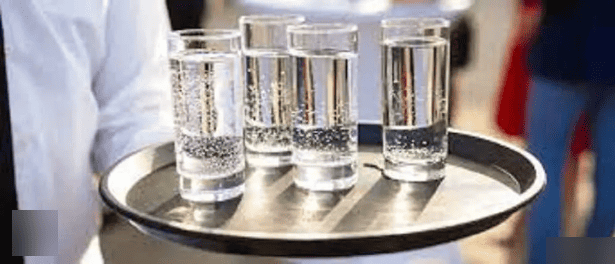
As we continue our enriching journey through the intricacies of whether or not “restaurants are required to provide free water,” we are now stepping into the practical side of things.
This time, we are delving into the essentials of setting up a restaurant water dispenser and formulating a water bottle policy that aligns with the ethos of your establishment.
So, let’s get started.
Tips for Restaurant Owners on Setting up a Water Dispenser
Setting up a water dispenser in your restaurant is not merely an addition to the amenities; it’s a crucial step toward fostering a customer-friendly environment. Here are some golden nuggets of wisdom that I’ve gathered over the years, which might come in handy:
- Selection of the Right Dispenser: The first step is choosing a dispenser that aligns with your restaurant’s needs and style. From traditional coolers to modern, eco-friendly options, the choices are plenty. Prioritize quality and durability to ensure a lasting service.
- Accessibility: Ensure that the water dispenser is set up in a location that is easily accessible to all customers without causing any congestion or hindrance to the dining experience.
- Hygiene and Maintenance: A restaurant water dispenser requires regular maintenance to function optimally. Scheduled cleaning and timely repairs are a must to provide clean and safe water.
- Legal Compliance: Be aware of the local laws and regulations on drinking water legislation and ensure your water dispenser complies with the necessary safety and hygiene standards.
- Eco-Friendly Options: In this age of environmental consciousness, consider opting for dispensers that minimize waste and encourage refillable bottle usage, promoting eco-friendly practices.
Water Bottle Policy in Eateries: A Guide
Formulating a water bottle policy can sometimes be a complex affair, given the various aspects it encompasses. Here, I’m laying out a guide that might help you navigate this territory with ease:
- Promote Reusable Bottles: Encourage patrons to bring their reusable bottles, a step towards reducing plastic waste and promoting a greener planet.
- Transparency is Key: Be open about your water source and quality. This builds trust and can be a unique selling point if you offer high-quality, filtered water.
- Charging Policy: If you opt for bottled water, ensure the pricing policy is transparent and communicated clearly to avoid customer dissatisfaction.
- Educational Initiatives: Take a step further by educating your patrons on the environmental impacts of bottled water usage, fostering an environment of informed choices and sustainable practices.
As we gear up to conclude this enlightening exploration, the practicalities of setting up a water system in a restaurant are indeed as vast and varied as the culinary world itself.
As a restaurant owner, being equipped with the proper knowledge can help create a seamless and enriching experience for your customers while also adhering to environmentally friendly water practices.
Cultivating a Respectful Restaurant Hydration Etiquette
In this section, we venture into the heart of fostering respectful hydration etiquette in restaurants, where customer service meets environmental stewardship.
As restaurant owners, balancing customer expectations for free water and being environmentally conscious is vital. So, without further ado, let’s dive right in.
Encouraging an Etiquette that Respects both Customer Expectations and Environmental Concerns
As we navigate the ever-evolving landscape of the restaurant business, one thing remains constant – the need to cultivate a respectful restaurant hydration etiquette.
This encompasses many elements, from understanding the intricate dynamics of “Are restaurants required to provide free water?” to fostering a culture that seamlessly integrates customer service and environmental consciousness.
Here’s a guide to help you foster a policy that respects both realms:
- Understanding Customer Expectations: To start, you must understand what your customers expect regarding complimentary water service. This could mean doing quick surveys or having casual chats to gather valuable insights.
- Green Initiatives: Align your water service policies with green initiatives. From offering glass bottles instead of plastic to promoting the usage of refillable bottles, every step counts in fostering an environmentally conscious service.
- Serving Water Upon Request: To avoid wastage, consider serving water only upon request, a practice that resonates in many restaurants globally.
- Informed Staff: Ensure your staff is well-informed and educated on the nuances of your water service policy, enabling them to communicate the same effectively to the customers.
- Creating Awareness: Utilize your platforms to create awareness about water conservation and the initiatives your restaurant is undertaking to contribute.
Insights on Fostering a Positive Culture Around Water Service
Creating a culture that reverberates with positivity around water service is a journey, one that is fulfilling and enriching. Here are some insights to guide you on this path:
- Educational Campaigns: Host campaigns or workshops that educate your staff and customers on the significance of water conservation, creating a ripple effect of positive change.
- Collaborations with Environmental Organizations: Collaborate with environmental organizations to foster a culture deeply rooted in sustainable practices.
- Reward Initiatives: Introduce reward initiatives for customers who adhere to and promote sustainable water usage practices within your establishment.
- Feedback and Improvements: Always keep the lines of communication open for feedback and continually strive to improve and fine-tune your policies, aligning them more with the evolving dynamics of customer expectations and environmental concerns.
As we navigate through this journey, it’s heartening to witness a harmonious amalgamation of hospitality and environmental conservation taking shape.
It paints a promising picture of the future, where restaurants are spaces of culinary delights and hubs of positive change, fostering a culture that respects and nurtures the environment.
Frequently Asked Questions
Why is water always free at restaurants?
While many restaurants nationwide offer free drinking water, it’s only sometimes the case, especially in water-scarce states like California. Due to water conservation rules implemented in 2015, restaurants in certain areas can only serve water if requested explicitly by the customer.
Do restaurants have to offer free water in Texas?
In Texas, restaurants, bars, and similar commercial establishments aren’t mandated to provide complimentary drinking water to customers. It is offered only when a customer explicitly requests it.
Can you ask for water in a restaurant?
You can request water in a restaurant. Generally, you will receive tap water, which might be purified in upscale restaurants. However, if you prefer bottled water, specify the type – sparkling or non-sparkling.
Can restaurants charge for water in Arizona?
In Arizona, most restaurants offer a complimentary glass of water if asked. While some believe it is against the law to refuse water to someone, the origins of such a law remain unclear and undocumented.
Why is water not free at McDonald’s?
Water may no longer be complimentary at some McDonald’s outlets, especially for larger cup sizes. This change comes as many were exploiting the free water policy to get soda from the fountain instead. The guidelines regarding water charges may vary between locations.
Can restaurants charge for water in Florida?
Legally speaking, restaurants in Florida are not obligated to provide customers with free tap water. However, customers can access the tap water available in the restrooms.
Is it illegal to not serve tap water in NYC?
In New York City, since at least 1991, restaurants have been legally bound to offer water to their customers before pouring a glass, ensuring the customer’s consent.
Is water free at Starbucks?
Yes, Starbucks provides hot water free of charge, a popular choice for those looking to prepare instant oatmeal or tea while on the move.
Can you go to a restaurant and just get water?
Technically, you can visit a restaurant only to have water. However, doing so might invite questions from the management, and you might need to explain your choice only to order water.
What are the OSHA rules for water bottles?
OSHA mandates employers to supply sufficient potable drinking water to meet every employee’s health and personal needs. This water must be dispensed from a fountain, a covered container with disposable cups, or single-use bottles.
Can I ask for water at McDonald’s?
Indeed, you can ask for water at McDonald’s. However, keep in mind that policies regarding charging for water cups might vary, as many McDonald’s restaurants are franchise-owned.
Is water free at restaurants in Canada?
In Canada, establishments that serve alcohol are typically required to offer complimentary water to their customers, a practice rooted in U.K. laws. However, for large cup requests, a fee might be applicable.
Is McDonald’s supposed to charge for water?
While it’s unlawful for food businesses to refuse to provide free potable water to customers, they are allowed to impose a charge for the container in which the water is served.
Do restaurants have to provide free water in Australia?
In Australia, the regulations surrounding the provision of free water can vary. Nevertheless, according to the Liquor Regulation 2002, licensed venues must supply “cold drinking water” to patrons upon request.
Conclusion – Are restaurants required to provide free water?
The Road Ahead: Hospitality and Water Service
As our deep dive reaches its conclusion, it’s only apt that we stop for a moment, draw a breath, and reflect on the journey we have embarked upon together.
We have covered extensive ground, from exploring drinking water legislation worldwide to delving into the intricate water policies of dining establishments.
We have navigated the evolution of complimentary water service, examined its implications on health, and contemplated the ethical considerations surrounding free water in restaurants.
We even ventured into the pragmatic realm of setting up a water dispenser. We cultivated an understanding of nurturing respectful restaurant hydration etiquette.
Clearly, the dynamics of offering free water in restaurants is not just a matter of hospitality but transcends into the realms of environmental ethics and customer service excellence.
Jeff Smith is a Restaurant Consultant with over 20 years of hospitality experience ranging from server to owner and general manager. He focuses on Restaurant POS technology as well as restaurant marketing. Check out our world-famous restaurant resources page for a comprehensive offering of hand-picked resources and tools to help your business. You can also check out some of our other restaurant business articles.

